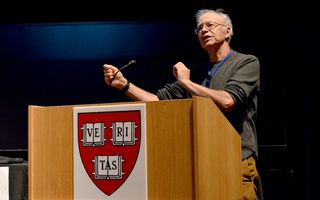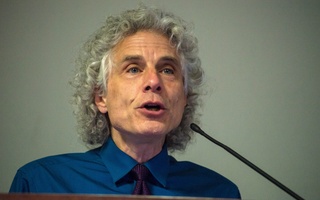Matthieu Ricard, a French-born scientist and Buddhist monk deemed “the happiest man in the world” after a University of Wisconsin-Madison study tracked his neural activity, discussed altruism as a solution to global issues in front of a packed auditorium at the Kennedy School of Government on Friday afternoon.
Speaking about his recent book “Altruism,” Ricard presented altruism in the contexts of economic inequality and environmental sustainability, emphasizing its power to affect societal and personal change.
“I was always interested in happiness for different reasons...but something was missing,” Ricard said in his lecture, which was sponsored by the Kennedy School’s Center for Public Leadership. “Then I realized there is no such thing as selfish happiness. The pursuit of selfish happiness is born to fail.”
Ricard described humanity as standing “on the edge of the precipice” on both the individual and societal level, focusing on the issue of “poverty in the midst of plenty.” He said growing inequalities within countries and between countries have placed the world “at the edge.”
“We know that in any countries where inequalities are large, everyone will suffer from it,” he added.
Ricard also explored the problem of environmental sustainability and the general misconception that humans have “unlimited resources.”
“By 2050, we’ll need three planets,” he said. “We don’t have them.”
After outlining the issues of socioeconomic inequality and exploitation of natural resources, Ricard suggested altruism as a means of solving major global challenges.
Bringing in his experiences as a scientist and Buddhist monk, Ricard presented data and brain imaging from a study of experienced meditators in a Himalayan monastery which showed the changes in the brain that can result from daily mindfulness-based meditation. According to Ricard, in as little as two weeks, test subjects showed an increase in “pro-social” behavior, indicated by structural changes in the amygdala.
To bring this model of individual change to a societal level, Ricard introduced the theory of evolution of culture, explaining that culture changes “faster than genes” do.
Ricard ended his lecture with solutions for bringing about such an evolution of culture in the direction of altruism and cooperation, including the creation of “caring economies” and the encouragement of “local commitment and global responsibility” as cultural values.
“We need a unifying concept to work together towards a better world,” he said. “It appears to me that there’s no other common concept for working together than having more consideration for others.”
Read more in University News
Provost Lauds HarvardX, But Questions Its Financial SustainabilityRecommended Articles
-
The Life of Bertrand Russell: Apologia for Modern PaganismBertrand Russell stands at the end of a philosophic line of succession extending from John Locke through David Hume and
-
Professor Discusses the Root of AltruismFelix Warneken, an assistant professor of psychology, discussed the question of whether human altruism is a product of biology or environmental conditions Tuesday evening in a seminar organized by the Harvard Society for Mind, Brain, and Behavio
-
How Philosophy Made My Life AwesomeIt’s a genuine excitement that we have the ability to do so much to improve the world, and a desire to make the absolute most of it that we can.
-
 Philosopher Peter Singer Discusses Effective Altruism
Philosopher Peter Singer Discusses Effective Altruism -
 Despite Terrorism, Violence Is on the Decline, Pinker Says
Despite Terrorism, Violence Is on the Decline, Pinker Says













